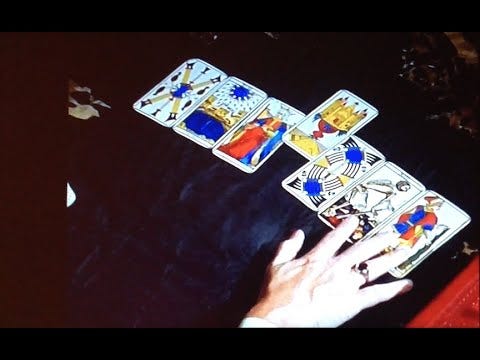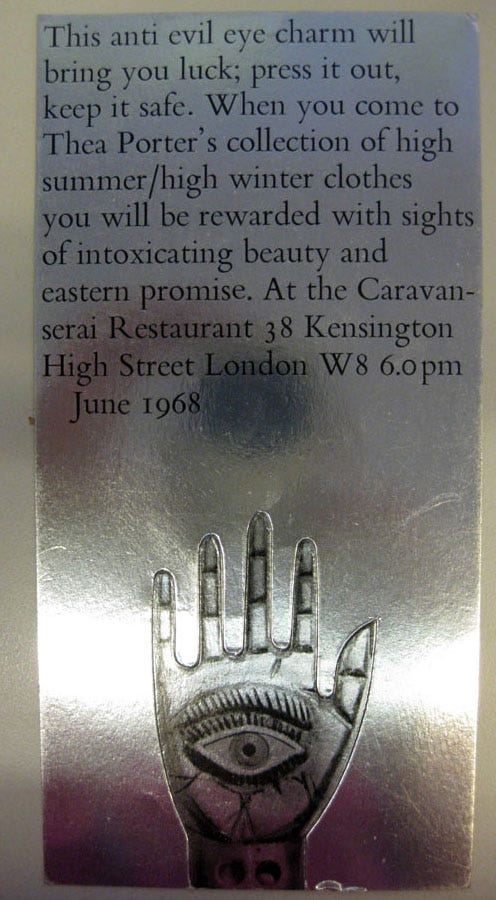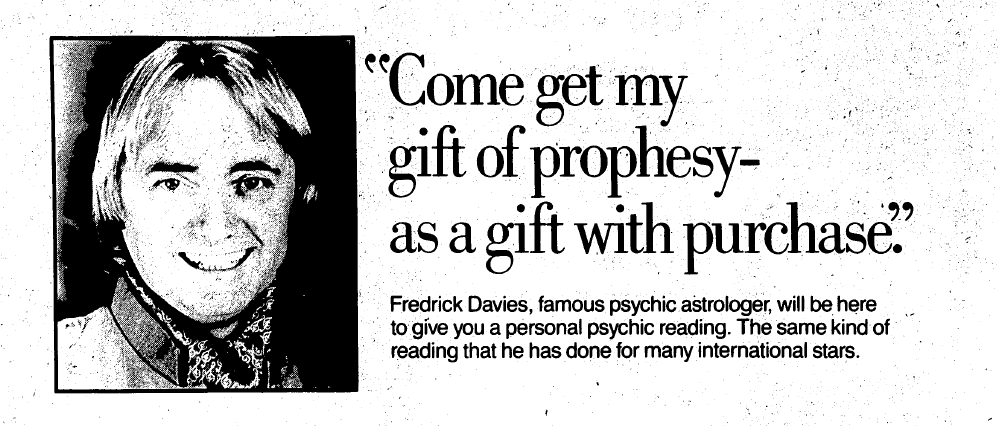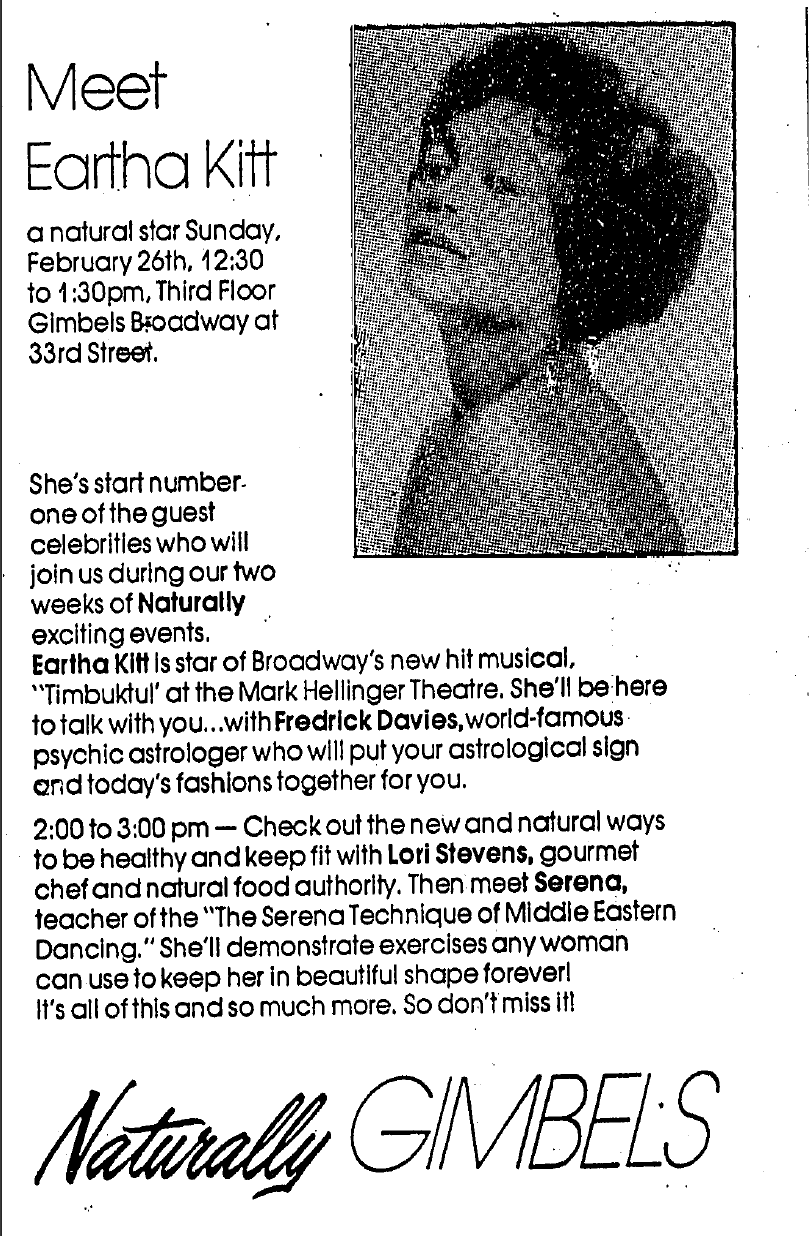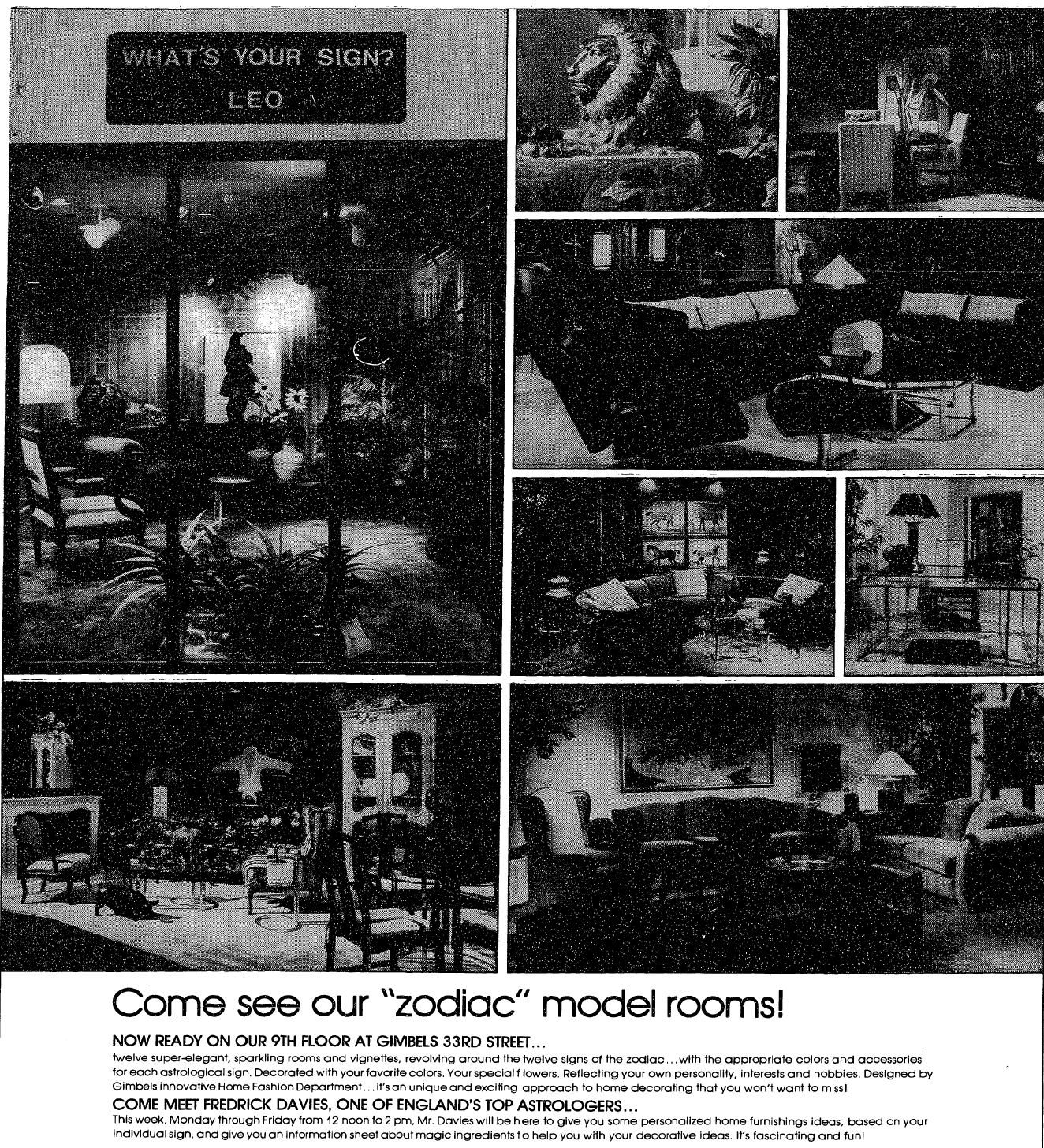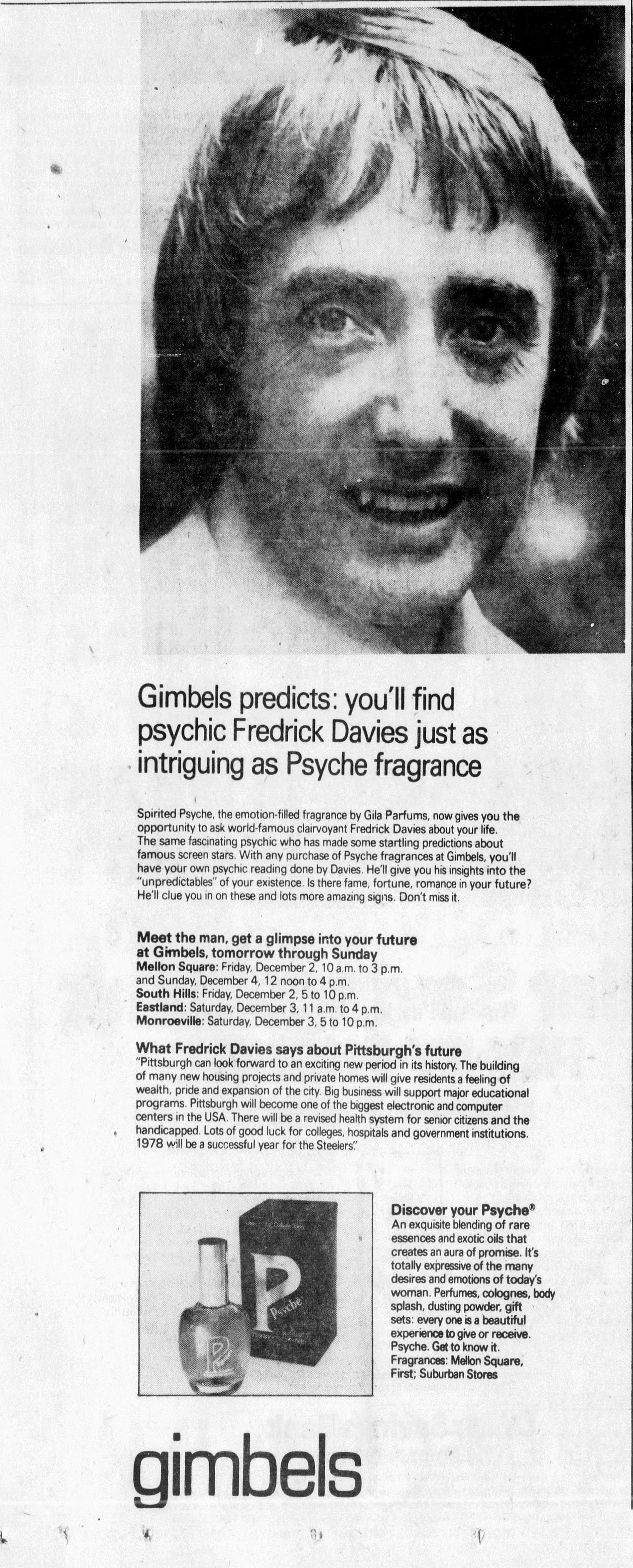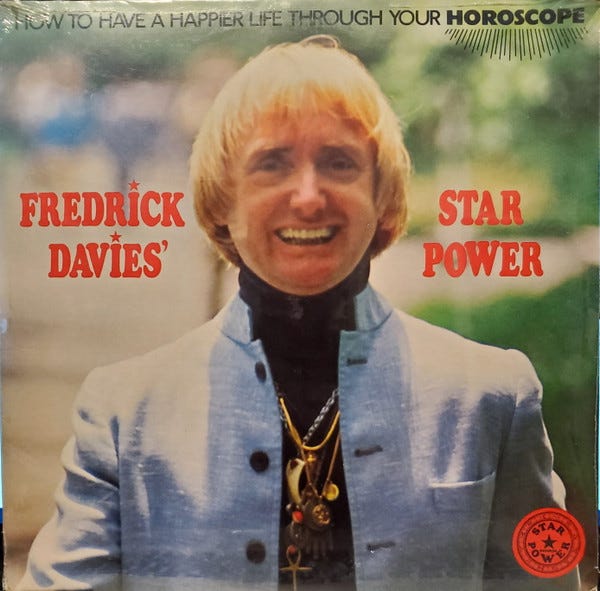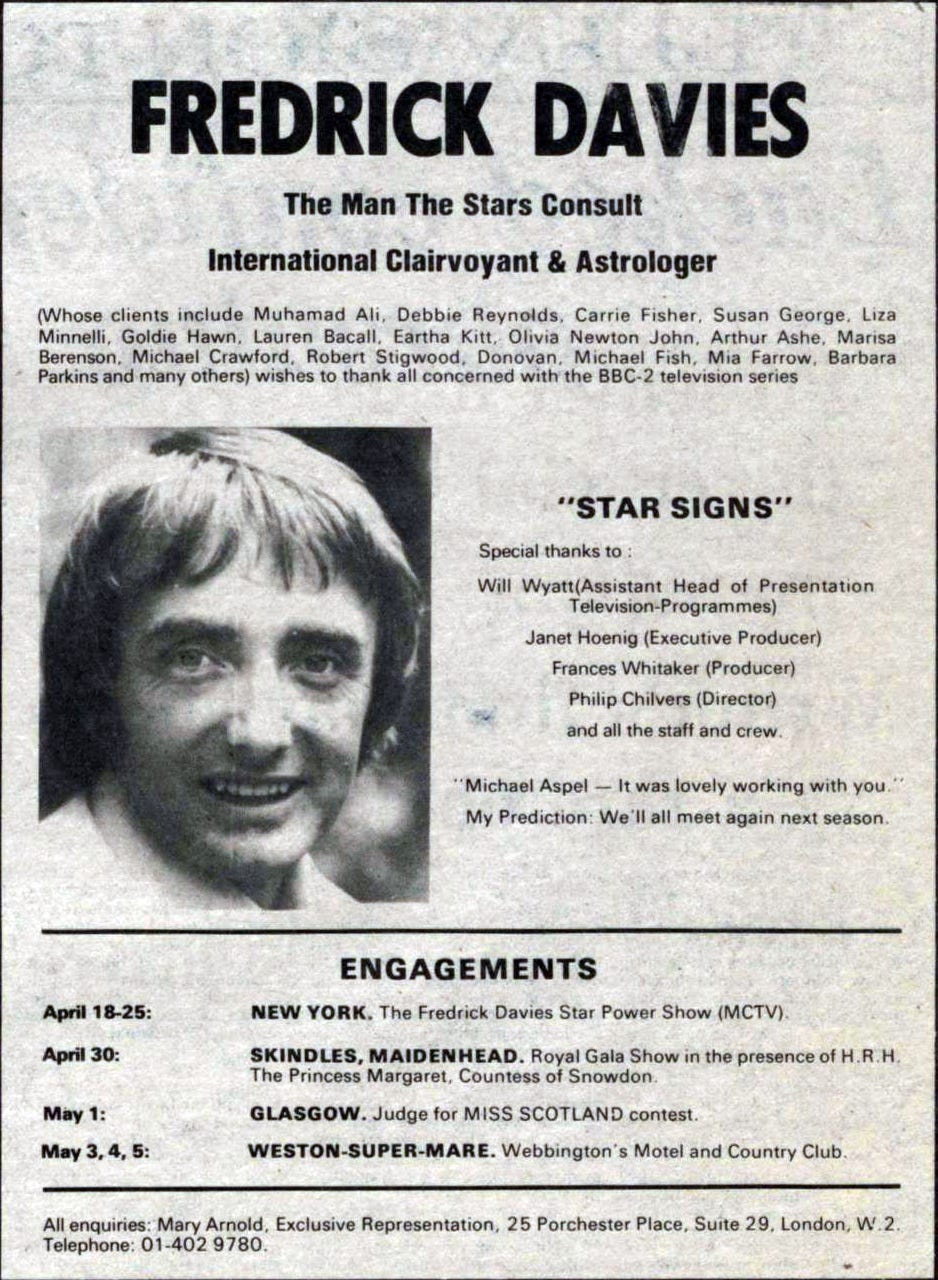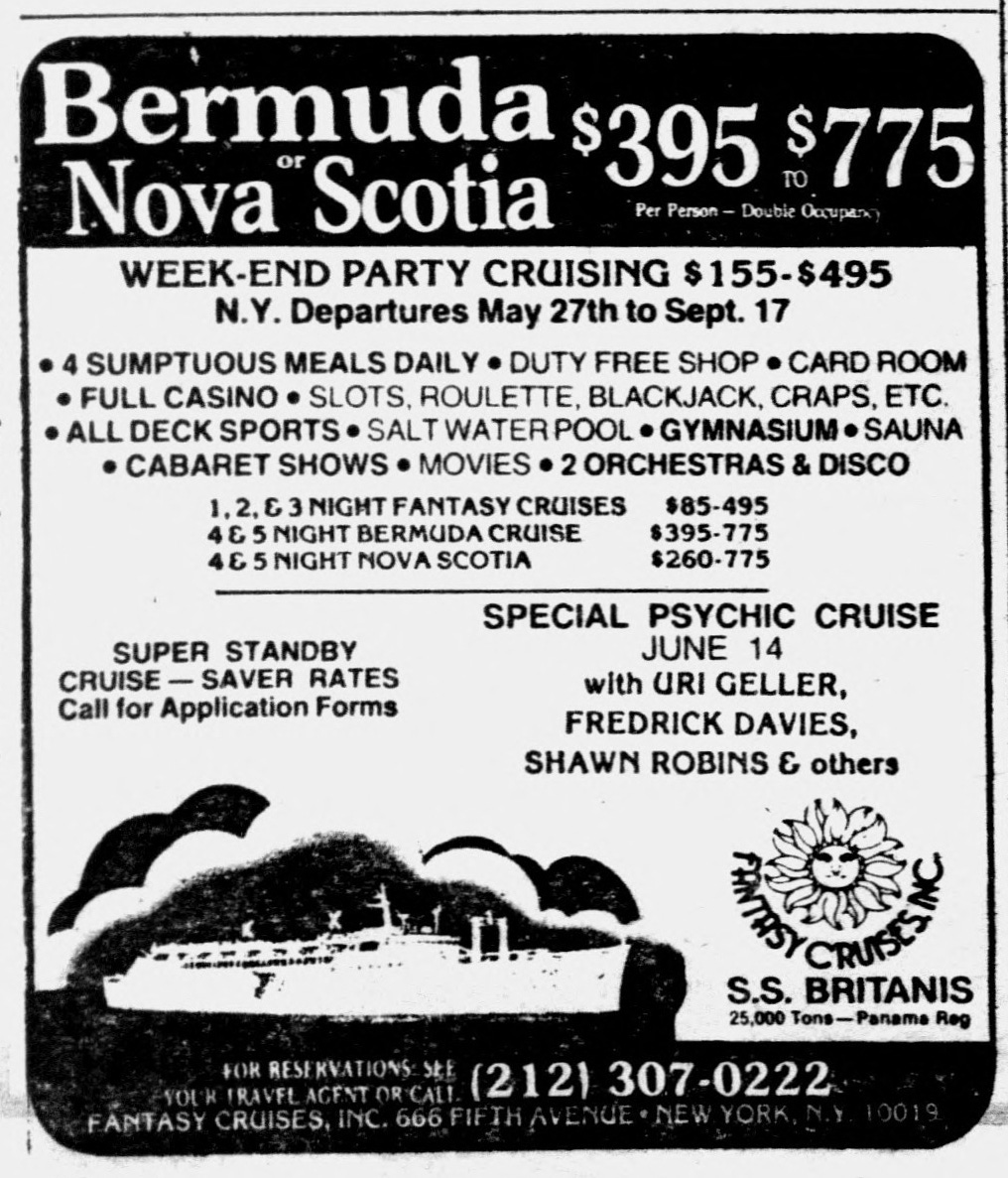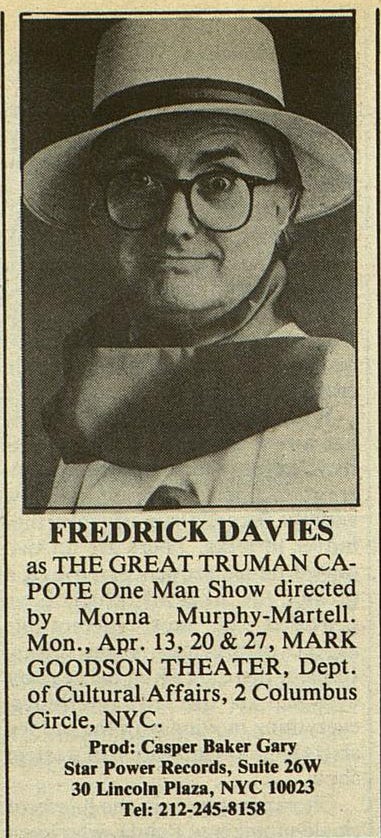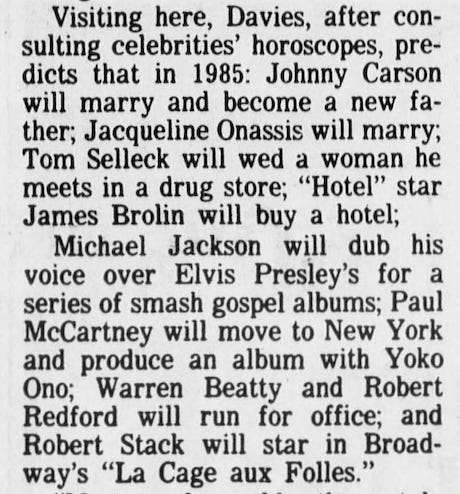Several months ago, while doing research for a large project, I was skimming through pages of a late seventies newspaper when my eyes alighted on a person I became acquainted with while researching Thea Porter. The name? Fredrick Davies, astrologer to the stars.
To backtrack a little, I wrote a book and curated a museum exhibition on the fashion designer Thea Porter. The early research for these (and for my earlier master’s thesis on her) was done by carefully sorting through boxes of Thea’s papers that had been sitting, unorganized, for decades. Thea was diagnosed with Alzheimer’s in 1994 and put into a home, where she passed away in 2000, but even in her healthiest years, she had never cared a jot for structure and organization. Jumbled in filing boxes were unpaid gas bills from the 1980s, clippings of celebrities wearing her clothes in the seventies, sketches from the 1960s, and childhood photos. Sifting through I found heavily annotated typewritten pages, which slowly came together to form an unpublished autobiography she had written in the late 1980s (since published as Thea Porter’s Scrapbook).
One of the things she spoke of was her reliance on astrologers. Raised as she was in Damascus in the 1930s, divination was a common activity—and one she depended on heavily throughout her career. Writing of her first fashion show, held at one of the first Arabic restaurants in London, Caravanserai, she touched lightly on her beliefs:
The invitation I sent out to view my collection featured a Hand of Fatima, with an unblinking eye staring out from the palm—reflecting my enduring, if feeble-minded, interest in clairvoyants, astrologers and soothsayers. Indeed, there was a time in the Sixties and Seventies when I would take no business decision, hardly any decision at all, without first consulting Katina, a dark, stooped, Greek lady of advanced age who had an uncanny gift of second sight. At any rate I believed in her.1
In another place, Thea speaks of changing the date for a fashion show at the last moment based on Katina’s “urgent advice.” Thea’s words are marked by a sense of the hindsight she had gathered now that her career was over, the result of taking a number of poor business decisions possibly/likely influenced by “clairvoyants, astrologers and soothsayers.”
Like most women I'm foolish, and foolish enough to believe in the stars and I never make a decision without consulting Katina, but I must confess that if she doesn't tell me what I want to hear I sometimes go round the corner and consult a rival astrologer.2
Among her papers, I also found a letter that mentioned having watched Thea on a TV programme the night before. With only a date on the letter (solely labeled October 22) and the show’s name (Tonight), it took me quite a bit of time and many scans through TV listings in old newspapers to finally track it down. On October 21, 1975, the BBC’s Tonight programme featured a profile of Thea (the other half of the show was a story on foster children in south London). I requested a viewing through the British Film Institute.
A note on the clip: The BFI does not allow you to take videos while viewing items in the archive, so I had to do so surreptitiously. Taking these clips was important as they proved to the museum I was working with how necessary it was to allot part of the budget to get the rights to show this programme during the exhibition’s run. We were able to feature a TV showing it on a loop in the final room. I also shared these clips with Richard Kovitch, who was able to include a part in his documentary on Penny Slinger (she was one of the guests at the dinner party).
Here is where Fredrick Davies returns to our story. The segment starts with Thea Porter shopping at Soho’s Berwick Street market before heading to her store a few blocks over on Greek Street. Jan de Villeneuve and Hazel Clark swan around the shop, modeling Thea’s Arab-inspired designs, intercut with Thea speaking about her career. Maurice Jarre’s wife orders a dress, Thea speaks about her celebrity clientele, shows off her exotic home, then Fredrick appears on screen pulling tarot cards before a final dinner party scene.
It may not surprise you to know that there is little or no formal business advice in Thea’s world, but every day she does consult the stars. Whenever possible she brings in Fredrick Davies, who acts as astrologer, clairvoyant, business advisor to many like her. To the tarot cards she will pose her dilemmas, and from Fredrick Davies she will receive guidance. – BBC announcer
I believe that astrology provides a kind of framework, and so you then find you have several choices and it quite often helps you to make the right choice… I’m extremely superstitious having lived in the Middle East for so long. I had my coffee cup read every morning. Now, of course, I have to go and see Fredrick Davies, because, for different reasons, my life has changed and whenever I need some business advice I go to Fredrick, and its practically the only business advice I get.
In the clip shown above, Fredrick pulls cards about two American contacts with possible business deals. He highly favors one over the other, and it is clear from Thea’s demeanor that she will follow his advice; talking with Thea’s daughter later, it is likely that the deal she did not choose is one that instead went successfully to the Emanuel’s (designers of Princess Diana’s wedding dress and mine).
So, who was Fredrick Davies? And how did he gain so much control over a famous fashion designer? While researching Thea, I didn’t investigate him more than to confirm that he was a real person, an astrologer and an advisor of hers—that all was true.
Born in Shoreditch in 1936, Davies trained as an actor and appears to have a quite successful career in British TV and movies—his IMDB, under “Fred Davies,” lists 73 credits from 1948 to 1978. Somewhere during that time, he also apparently worked as a speech therapist in Newfoundland and Labrador. It appears that he began doing readings as a side job while acting in the early 1970s, embarking “upon his career after consulting an astrologer and a tarot card reader who described past and future events in his life with uncanny accuracy.”3 One article relays how “Before Davies became famous he arrived in Rome with $28 and a deck of tarot cards for a promised film role he didn’t get. He was stranded, living on a $2 pension, eating plain spaghetti with an occasional onion squeezed over it, until a columnist mentioned his Tarot-reading skills. The next night 400 clients richer, Davies installed himself in a 16th century palace.”4 Later articles state that he studied under Carroll Righter in Los Angeles; Righter had worked with Hollywood notables since the late 1930s, gaining him the moniker “astrologer to the stars” long before he became one of Reagan’s go-to astrologer during Ronald’s presidency. Around this time, Frederick changed his name to Fredrick for a better numerology outlook: “Now I’m 268 and before I was 562. I used to, when I gave a lecture at a college or church, give the fee back. With 268, I keep it.”5
Through his continuing ties in show business, Davies collected a celebrity clientele and columns in some British tabloids, which further strengthened his fame. During this period, he met Thea and, with absolutely no background in business, became her business advisor. Perhaps it is unsurprising that a trained actor would be able to utilize those same skills to convincingly play the part of one who can perceive the future and have expertise beyond their knowledge.
By 1977, Davies was living in New York and was feted in the American press as an “internationally known astrologer and clairvoyant” who was a consultant “to such luminaries as Liza Minnelli, Lauren Bacall and Muhammed Ali.”6 He established ‘The Fredrick Davies Institute for Astrological Studies’ in New York and Washington—an official-sounding front for his $200 an-hour consultations ($910/hour today.) Davies became an astrologer for hire for department stores, traveling to branches across America, giving fashion advice or shilling perfumes by way of the zodiac. His minimum fee was $2,000 for 4 hours. At one point, if you got your hair done at Neiman Marcus it came with a free reading. At Gimbels, he helped create star-sign-inspired model rooms and gave interior design consultations.
Among his clients was Patricia Harmsworth, Lady Rothermere—the wife of British newspaper magnate Lord Rothermere who famously became known as “Bubbles” due to her penchant for champagne. He once persuaded her that she should close the deal on a Fifth Avenue apartment and an East River apartment when the moon was full; she bought both the same night, “within five minutes.” She then consulted with him about the decoration of their homes; ascertaining that she was a Taurus (characterized by loving comfort), he worked with her interior decorator to give their residences “a comfortable English country look ‘with a touch of French ribbons.’”7
Outside of stars and cards, Davies continued his show business career. In 1977 he produced a run of “Only a Woman,” a musical about the love story between women’s rights leader Lucy Stone and abolitionist Henry Blackwell, on Broadway. The music for this was written by Ralph Martell, who also composed and arranged (alongside Ernie Susser) theme music or the twelve signs of the zodiac for Frederick’s record, “Star Power: How To Have A Happier Life Through Your Horoscope.” In 1978 Davies signed on to star in “Mumbo,” “a musical farce about Africa” written by Martell and his wife Morna Murphy (who also wrote the book for “Only a Woman.”)8 Apparently, it was supposed to premiere at the Lincoln Center Library & Museum of Performing Arts’ special matinee series, but I have found no evidence of that. Strangely, many sources report that he acted in Andy Warhol’s Bad; if he did, he did not make the final cut (I have previously interviewed a star of that film, Tere Tereba—you can listen here). Davies returned briefly to the UK in 1979 to be the astrologer in residence on a new TV show, Star Signs. Lasting only six episodes, it was hosted by Michael Aspel and also featured a palmist named Darlinda.
The 1980s continued the same pattern—Davies giving consultations for celebrities and writing horoscopes for tabloids and magazines. Every new year he was trotted out to give predictions for the coming year—all spectacularly wrong, my favourite is when he tried to claim that his prediction of “Hattie” for Charles and Diana’s second child was actually correct since Harry is “so close.”9 For all those who love cruises and the occult, Davies was a guest on a special “Psychic Cruise” in 1982, alongside spoonbender Uri Geller and astrologer Shawn Robbins.
In 1985 he returned to the theatre with a one-man show, “The Great Capote,” in which he played Truman Capote. “Paying attention to cosmic arrangements, he consulted both his own and Capote’s astrological charts before proceeding with the show…”10 Directed by Morna Murphy-Martell (of “Only a Woman” and “Mumbo,” and also a critic for The Hollywood Reporter), “The Great Capote” premiered with three nights in London and his devoted client Lady Rothermere in the front row for each. The theatre press was quick to point out that if his play bombed, “the one thing he will never be able to complain is that it closed due to unforeseen circumstances—not if he doesn’t want to lose a stable to personal clients which reads like the cast list for one of those ritzy American charity shoes, that is.”11 It was not a success; Davies continued reading the cards and doing consults until he passed away from lung cancer in October 1988.
For someone who seemingly held so much sway over the lives of so many famous and well-known people, Davies has left barely a trace. Knowing stories like Thea’s—how much trust she put into Davies and others like him—and then doing research that proves how little knowledge he had, simply makes me feel frustrated. Over the years I’ve come across other similar tales—designers or artists, who without personal business acumen, have entrusted their companies’ decisions to similar charlatans. As someone who enjoys astrology (more so following the astrological weather for larger trends), I see those like Katina and Fredrick Davies—calmly giving strongly worded advice on subjects outside their purview—as not true astrologers, but as fraudulent advisors eager to make a quick buck through manipulation. What kind of continuing success would Thea have found if she hadn’t been so superstitious and easily swayed?
Found in Thea’s notes.
Ibid.
“Psychic Predictions of Frederick Davies,” Trivia-Library.com, https://www.trivia-library.com/b/psychic-predictions-of-frederick-davies.htm
Eileen Foley, “Psychic Attuned to Good Things,” Pittsburgh Post-Gazette, December 5, 1977, 5.
Ibid.
Ibid.
Nancy L. Ross, “Astrological Décor,” Washington Post, May 19, 1988, HO18.
“Fredrick Davies stars in ‘Mumbo,’” The Hollywood Reporter, August 21, 1978, 4.
Donald Miller, “It’s all in the stars for this prognosticator,” Pittsburgh Post-Gazette, March 23, 1985, 15.
Craig Rowland, “Two legends live again: Capote and Williams are recreated on stage,” The Advocate, December 10, 1985, 63.
Tabard, “Stargazer to the stars,” The Stage and Television Today, June 13, 1985, 10.

